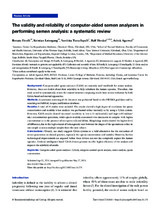The validity and reliability of computer-aided semen analyzers in performing semen analysis: a systematic review
Abstract
Background: Computer-aided sperm analyzers (CASA) are currently used worldwide for semen analysis.
However, there are doubts about their reliability to fully substitute the human operator. Therefore, this
study aimed to systematically review the current literature comparing results from semen evaluation by both
CASA-based and manual approaches.
Methods: A systematic screening of the literature was performed based on the PRISMA guidelines and by
searching on PubMed, Scopus, and Embase databases.
Results: A total of 14 studies were included. Our results showed a high degree of correlation for sperm
concentration and motility when analysis was performed either manually or by using a CASA system.
However, CASA results showed increased variability in low (<15 million/mL) and high (>60 million/
mL) concentration specimens, while sperm motility assessment was inaccurate in samples with higher
concentration or in the presence of non-sperm cells and debris. Morphology results showed the highest level
of difference, due to the high amount of heterogeneity seen between the shapes of the spermatozoa either in
one sample or across multiple samples from the same subject.
Conclusions: Overall, our study suggests CASA systems as a valid alternative for the evaluation of
semen parameters in clinical practice, especially for sperm concentration and motility. However, further
technological improvements are required before these devices can one day completely replace the human
operator. Artificial intelligence-based CASA devices promise to offer higher efficiency of the analysis and
improve the reliability of results.

